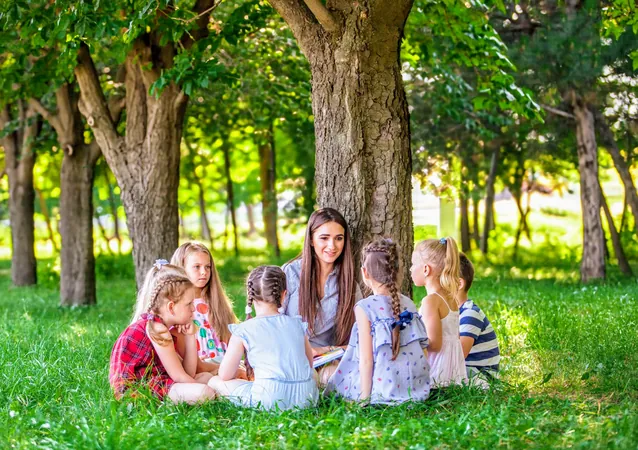
Outdoor Classes Revolutionize Children's Mental Health: The Surprising Benefits of Nature-Based Learning
2024-11-16
Author: Siti
Outdoor Classes Revolutionize Children's Mental Health: The Surprising Benefits of Nature-Based Learning
“Go outside and play!” – a familiar phrase from childhood that is now echoing in schools across Quebec, but with a refreshing twist. It's no longer just playtime being taken outdoors; actual classroom instruction is hitting the fresh air!
This innovative approach is supported by compelling research indicating that exposure to natural environments can significantly enhance children's mental health. Spearheaded by Sylvana Côté from the Observatoire pour l’éducation et la santé des enfants (OPES), along with a dedicated research team from McGill and Université de Montréal, the initiative is transforming our understanding of education and childhood development.
Nature as an Educational Ally
The study reveals astonishing findings: merely two hours of outdoor class time can considerably reduce emotional distress in children aged 10-12, especially those facing mental health challenges. These results are crucial given a recent UNICEF report which underscores the growing necessity of green spaces for child development.
In Spring 2023, researchers tracked the impact of outdoor learning on over 500 schoolchildren in Quebec. Post-intervention, the students displayed marked improvements, revealing that nature can serve as a powerful therapeutic medium. Remarkably, those who exhibited severe symptoms of anxiety, depression, and behavioral issues showed the most significant changes.
The Ripple Effect of Outdoor Classes
Teachers observed enhanced calmness and attentiveness among their students following the outdoor sessions. “Children with higher mental health symptoms at baseline showed greater reductions in symptoms following the intervention,” explained Professor Marie-Claude Geoffroy, a prominent figure in youth mental health research.
Côté further emphasized that these nature-based programs provide unique benefits to children with higher mental health vulnerabilities, potentially leveling the playing field among school-age children. The study utilized a randomized controlled trial, engaging over a thousand children from various socioeconomic backgrounds to capture genuine advantages of nature-based learning.
A Necessity Born from Adversity
The need for this initiative became apparent during the pandemic when the mental health risks of prolonged indoor confinement for children were on the rise. This prompted the creation of an intervention allowing children to learn in natural surroundings, with their mood and behavioral changes closely monitored.
Over three months, both the nature-intervention and control groups completed quick questionnaires to assess emotional and behavioral difficulties as well as strengths. The children didn't simply play in the sun; regular curricula—math, language, and science—were all taught outside. To further enhance mental health, brief 10-15 minute activities developed by the research team were integrated into each session.
A New Paradigm for Education Systems
Tianna Loose, the paper’s lead author and a post-doctoral fellow at Université de Montréal, highlights the implications of these findings for educators, policymakers, and mental health professionals. “The intervention was cost-effective, well-received, and posed no risks, making it a promising strategy for schools with access to green spaces,” she remarked.
The research team is enthusiastic about the prospect of initiating follow-up studies that involve teenagers, aiming to co-design outdoor interventions that cater to mental well-being, combat climate anxiety, and reinforce bonds with nature.
This groundbreaking shift in classroom dynamics signifies a broader transformation, merging educational methodologies with mental health strategies. It reinforces the belief that “the best classroom is roofed only by the sky.”
As a society, we must reassess and harness the limitless potential of nature in fostering the mental health of our younger generations.
The study is detailed in the journal JAMA Network Open, highlighting a hopeful trajectory for future educational practices.
Unlock the Secrets!
Subscribe to our newsletter for more captivating articles and stay informed on the continuing evolution of educational practices. Don't miss out on the latest trends in mental health interventions and outdoor learning!


 Brasil (PT)
Brasil (PT)
 Canada (EN)
Canada (EN)
 Chile (ES)
Chile (ES)
 España (ES)
España (ES)
 France (FR)
France (FR)
 Hong Kong (EN)
Hong Kong (EN)
 Italia (IT)
Italia (IT)
 日本 (JA)
日本 (JA)
 Magyarország (HU)
Magyarország (HU)
 Norge (NO)
Norge (NO)
 Polska (PL)
Polska (PL)
 Schweiz (DE)
Schweiz (DE)
 Singapore (EN)
Singapore (EN)
 Sverige (SV)
Sverige (SV)
 Suomi (FI)
Suomi (FI)
 Türkiye (TR)
Türkiye (TR)